Trauma-Informed Practice in Healthcare: A Case Study on Lisa
VerifiedAdded on 2023/04/19
|10
|3201
|87
Report
AI Summary
This report provides a comprehensive analysis of Lisa's case, a patient struggling with substance use and potential trauma. It examines the factors contributing to her drug use, including relationship issues, family dynamics, and medication discontinuation. The report highlights the importance of trauma-informed practice, emphasizing the need for healthcare professionals, particularly nurses, to understand and address the patient's past experiences and current mental state. It explores the principles of trauma-informed care, such as ensuring safety, promoting choice, and fostering collaboration between the nurse and care user. The report also discusses the roles of other members of the multidisciplinary team in providing holistic care, including physicians, counselors, and family members. Furthermore, the report outlines various interventions, such as communication strategies, family support, and medication management, to address the patient's needs and promote recovery. The report underscores the significance of empathy, awareness of mental illness, and effective teamwork in delivering quality care to individuals affected by trauma and substance use.
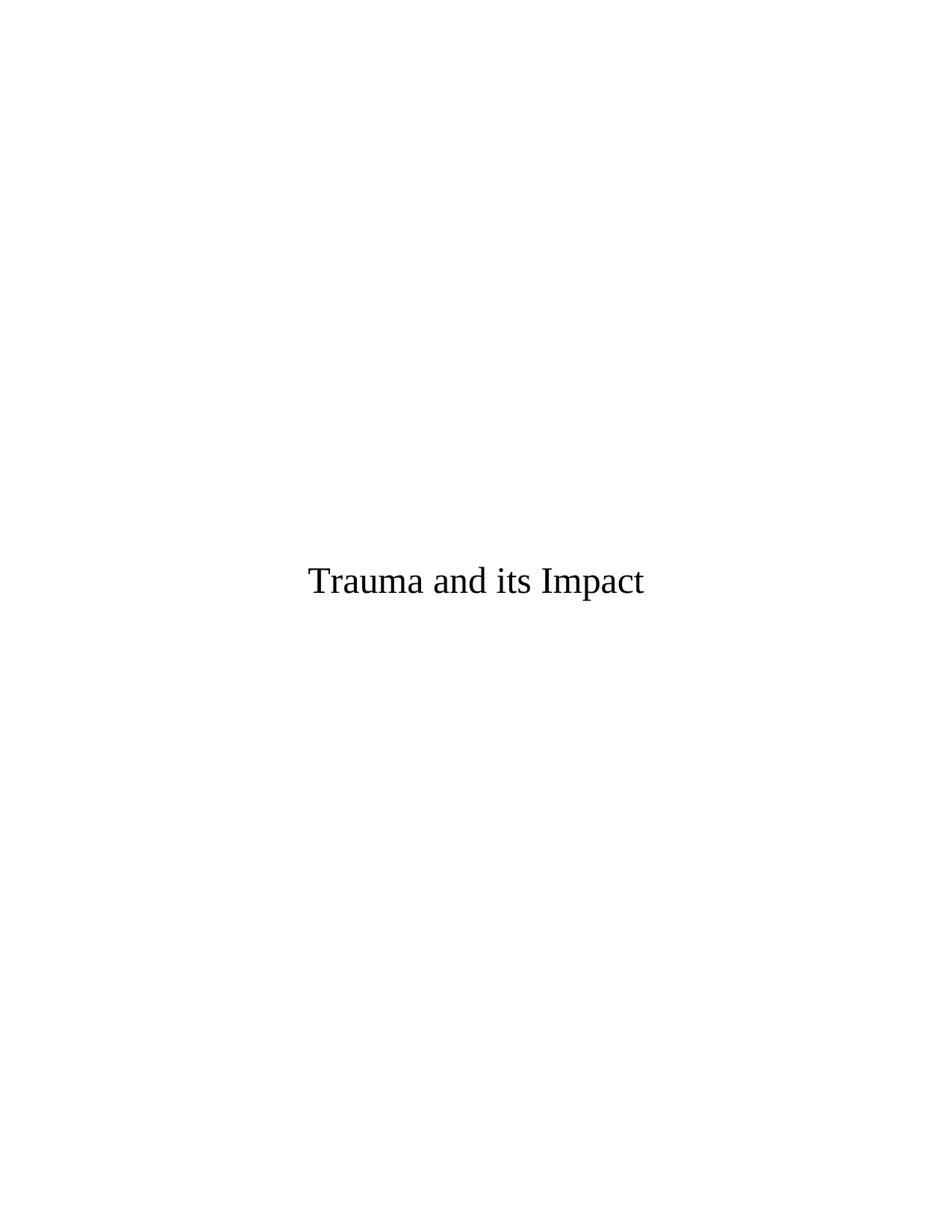
Trauma and its Impact
Paraphrase This Document
Need a fresh take? Get an instant paraphrase of this document with our AI Paraphraser
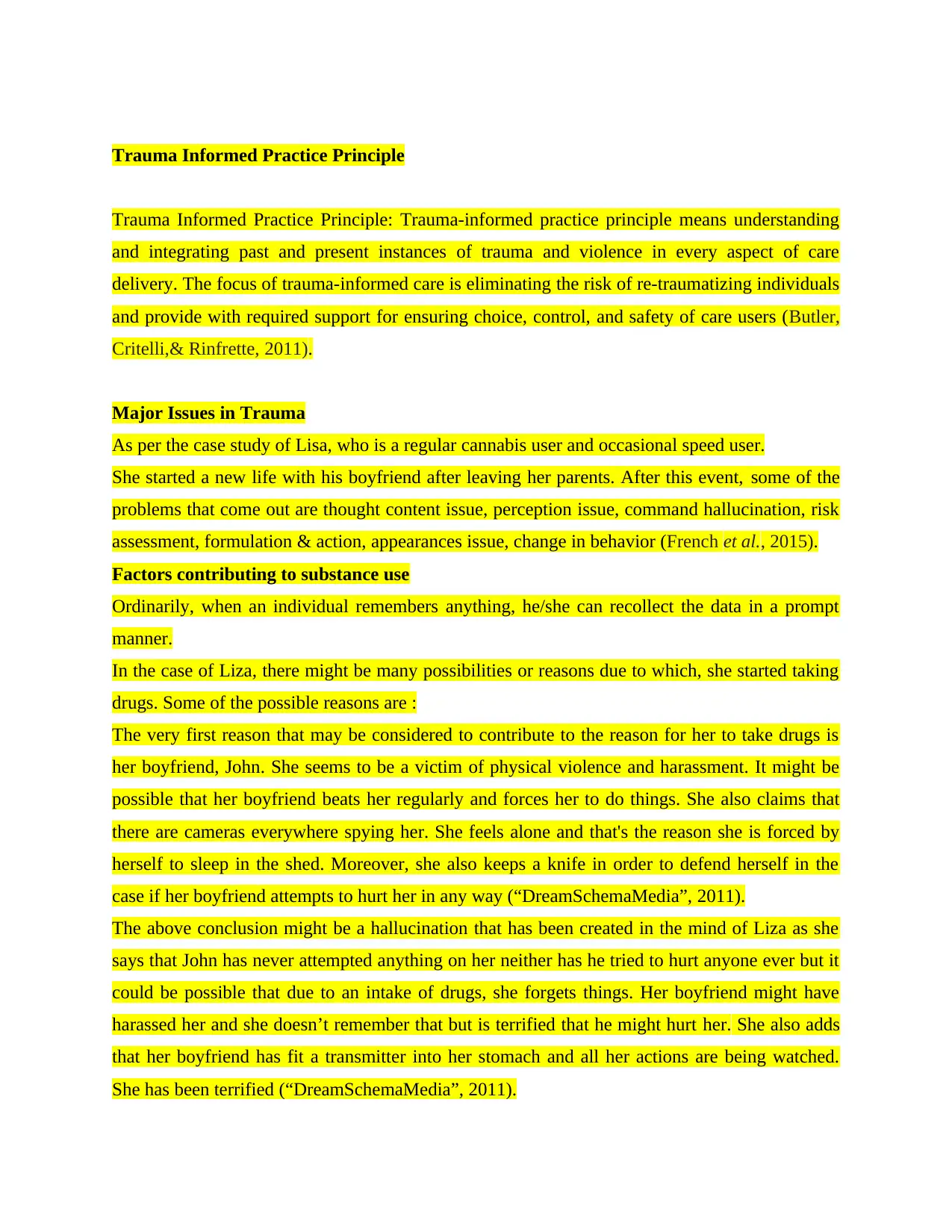
Trauma Informed Practice Principle
Trauma Informed Practice Principle: Trauma-informed practice principle means understanding
and integrating past and present instances of trauma and violence in every aspect of care
delivery. The focus of trauma-informed care is eliminating the risk of re-traumatizing individuals
and provide with required support for ensuring choice, control, and safety of care users (Butler,
Critelli,& Rinfrette, 2011).
Major Issues in Trauma
As per the case study of Lisa, who is a regular cannabis user and occasional speed user.
She started a new life with his boyfriend after leaving her parents. After this event, some of the
problems that come out are thought content issue, perception issue, command hallucination, risk
assessment, formulation & action, appearances issue, change in behavior (French et al., 2015).
Factors contributing to substance use
Ordinarily, when an individual remembers anything, he/she can recollect the data in a prompt
manner.
In the case of Liza, there might be many possibilities or reasons due to which, she started taking
drugs. Some of the possible reasons are :
The very first reason that may be considered to contribute to the reason for her to take drugs is
her boyfriend, John. She seems to be a victim of physical violence and harassment. It might be
possible that her boyfriend beats her regularly and forces her to do things. She also claims that
there are cameras everywhere spying her. She feels alone and that's the reason she is forced by
herself to sleep in the shed. Moreover, she also keeps a knife in order to defend herself in the
case if her boyfriend attempts to hurt her in any way (“DreamSchemaMedia”, 2011).
The above conclusion might be a hallucination that has been created in the mind of Liza as she
says that John has never attempted anything on her neither has he tried to hurt anyone ever but it
could be possible that due to an intake of drugs, she forgets things. Her boyfriend might have
harassed her and she doesn’t remember that but is terrified that he might hurt her. She also adds
that her boyfriend has fit a transmitter into her stomach and all her actions are being watched.
She has been terrified (“DreamSchemaMedia”, 2011).
Trauma Informed Practice Principle: Trauma-informed practice principle means understanding
and integrating past and present instances of trauma and violence in every aspect of care
delivery. The focus of trauma-informed care is eliminating the risk of re-traumatizing individuals
and provide with required support for ensuring choice, control, and safety of care users (Butler,
Critelli,& Rinfrette, 2011).
Major Issues in Trauma
As per the case study of Lisa, who is a regular cannabis user and occasional speed user.
She started a new life with his boyfriend after leaving her parents. After this event, some of the
problems that come out are thought content issue, perception issue, command hallucination, risk
assessment, formulation & action, appearances issue, change in behavior (French et al., 2015).
Factors contributing to substance use
Ordinarily, when an individual remembers anything, he/she can recollect the data in a prompt
manner.
In the case of Liza, there might be many possibilities or reasons due to which, she started taking
drugs. Some of the possible reasons are :
The very first reason that may be considered to contribute to the reason for her to take drugs is
her boyfriend, John. She seems to be a victim of physical violence and harassment. It might be
possible that her boyfriend beats her regularly and forces her to do things. She also claims that
there are cameras everywhere spying her. She feels alone and that's the reason she is forced by
herself to sleep in the shed. Moreover, she also keeps a knife in order to defend herself in the
case if her boyfriend attempts to hurt her in any way (“DreamSchemaMedia”, 2011).
The above conclusion might be a hallucination that has been created in the mind of Liza as she
says that John has never attempted anything on her neither has he tried to hurt anyone ever but it
could be possible that due to an intake of drugs, she forgets things. Her boyfriend might have
harassed her and she doesn’t remember that but is terrified that he might hurt her. She also adds
that her boyfriend has fit a transmitter into her stomach and all her actions are being watched.
She has been terrified (“DreamSchemaMedia”, 2011).
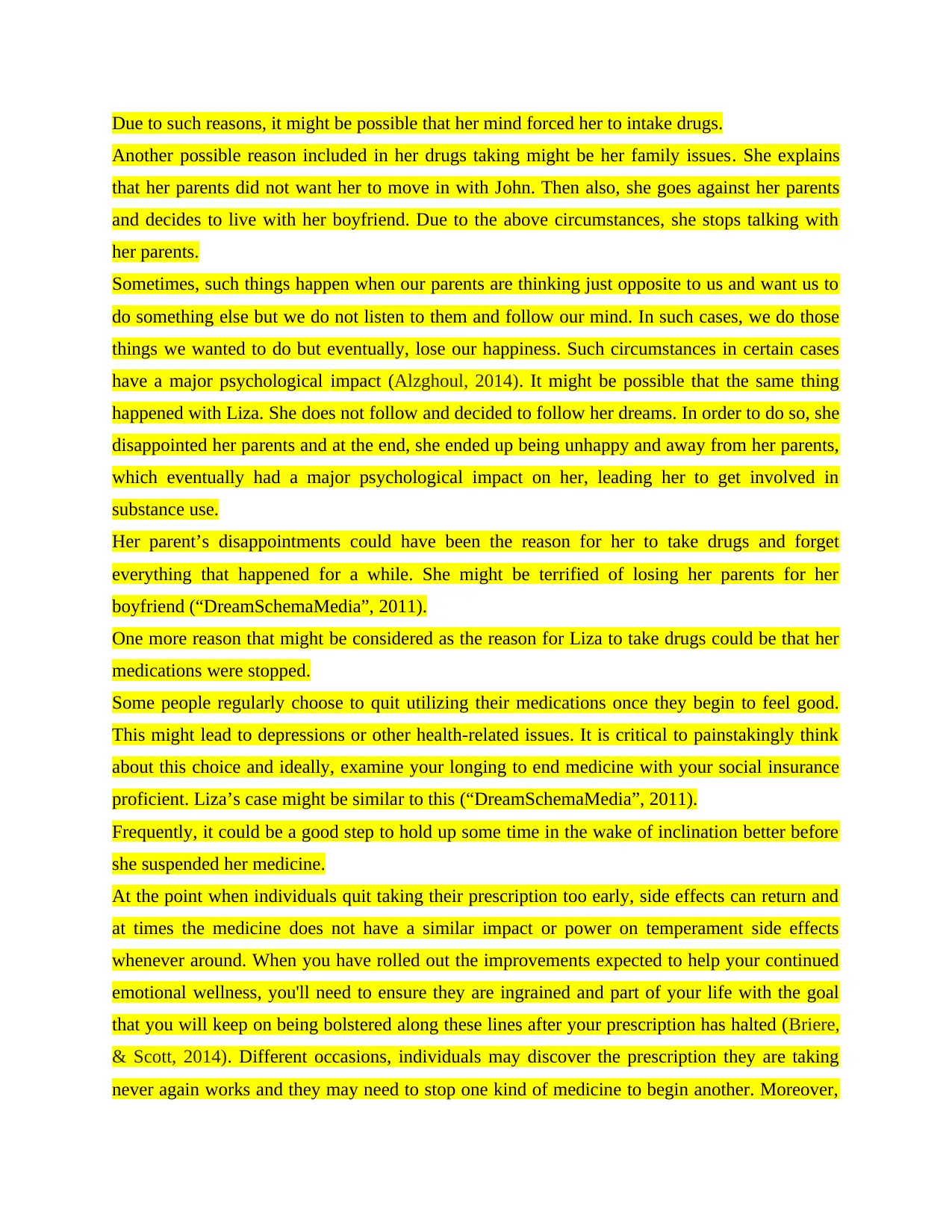
Due to such reasons, it might be possible that her mind forced her to intake drugs.
Another possible reason included in her drugs taking might be her family issues. She explains
that her parents did not want her to move in with John. Then also, she goes against her parents
and decides to live with her boyfriend. Due to the above circumstances, she stops talking with
her parents.
Sometimes, such things happen when our parents are thinking just opposite to us and want us to
do something else but we do not listen to them and follow our mind. In such cases, we do those
things we wanted to do but eventually, lose our happiness. Such circumstances in certain cases
have a major psychological impact (Alzghoul, 2014). It might be possible that the same thing
happened with Liza. She does not follow and decided to follow her dreams. In order to do so, she
disappointed her parents and at the end, she ended up being unhappy and away from her parents,
which eventually had a major psychological impact on her, leading her to get involved in
substance use.
Her parent’s disappointments could have been the reason for her to take drugs and forget
everything that happened for a while. She might be terrified of losing her parents for her
boyfriend (“DreamSchemaMedia”, 2011).
One more reason that might be considered as the reason for Liza to take drugs could be that her
medications were stopped.
Some people regularly choose to quit utilizing their medications once they begin to feel good.
This might lead to depressions or other health-related issues. It is critical to painstakingly think
about this choice and ideally, examine your longing to end medicine with your social insurance
proficient. Liza’s case might be similar to this (“DreamSchemaMedia”, 2011).
Frequently, it could be a good step to hold up some time in the wake of inclination better before
she suspended her medicine.
At the point when individuals quit taking their prescription too early, side effects can return and
at times the medicine does not have a similar impact or power on temperament side effects
whenever around. When you have rolled out the improvements expected to help your continued
emotional wellness, you'll need to ensure they are ingrained and part of your life with the goal
that you will keep on being bolstered along these lines after your prescription has halted (Briere,
& Scott, 2014). Different occasions, individuals may discover the prescription they are taking
never again works and they may need to stop one kind of medicine to begin another. Moreover,
Another possible reason included in her drugs taking might be her family issues. She explains
that her parents did not want her to move in with John. Then also, she goes against her parents
and decides to live with her boyfriend. Due to the above circumstances, she stops talking with
her parents.
Sometimes, such things happen when our parents are thinking just opposite to us and want us to
do something else but we do not listen to them and follow our mind. In such cases, we do those
things we wanted to do but eventually, lose our happiness. Such circumstances in certain cases
have a major psychological impact (Alzghoul, 2014). It might be possible that the same thing
happened with Liza. She does not follow and decided to follow her dreams. In order to do so, she
disappointed her parents and at the end, she ended up being unhappy and away from her parents,
which eventually had a major psychological impact on her, leading her to get involved in
substance use.
Her parent’s disappointments could have been the reason for her to take drugs and forget
everything that happened for a while. She might be terrified of losing her parents for her
boyfriend (“DreamSchemaMedia”, 2011).
One more reason that might be considered as the reason for Liza to take drugs could be that her
medications were stopped.
Some people regularly choose to quit utilizing their medications once they begin to feel good.
This might lead to depressions or other health-related issues. It is critical to painstakingly think
about this choice and ideally, examine your longing to end medicine with your social insurance
proficient. Liza’s case might be similar to this (“DreamSchemaMedia”, 2011).
Frequently, it could be a good step to hold up some time in the wake of inclination better before
she suspended her medicine.
At the point when individuals quit taking their prescription too early, side effects can return and
at times the medicine does not have a similar impact or power on temperament side effects
whenever around. When you have rolled out the improvements expected to help your continued
emotional wellness, you'll need to ensure they are ingrained and part of your life with the goal
that you will keep on being bolstered along these lines after your prescription has halted (Briere,
& Scott, 2014). Different occasions, individuals may discover the prescription they are taking
never again works and they may need to stop one kind of medicine to begin another. Moreover,
⊘ This is a preview!⊘
Do you want full access?
Subscribe today to unlock all pages.

Trusted by 1+ million students worldwide
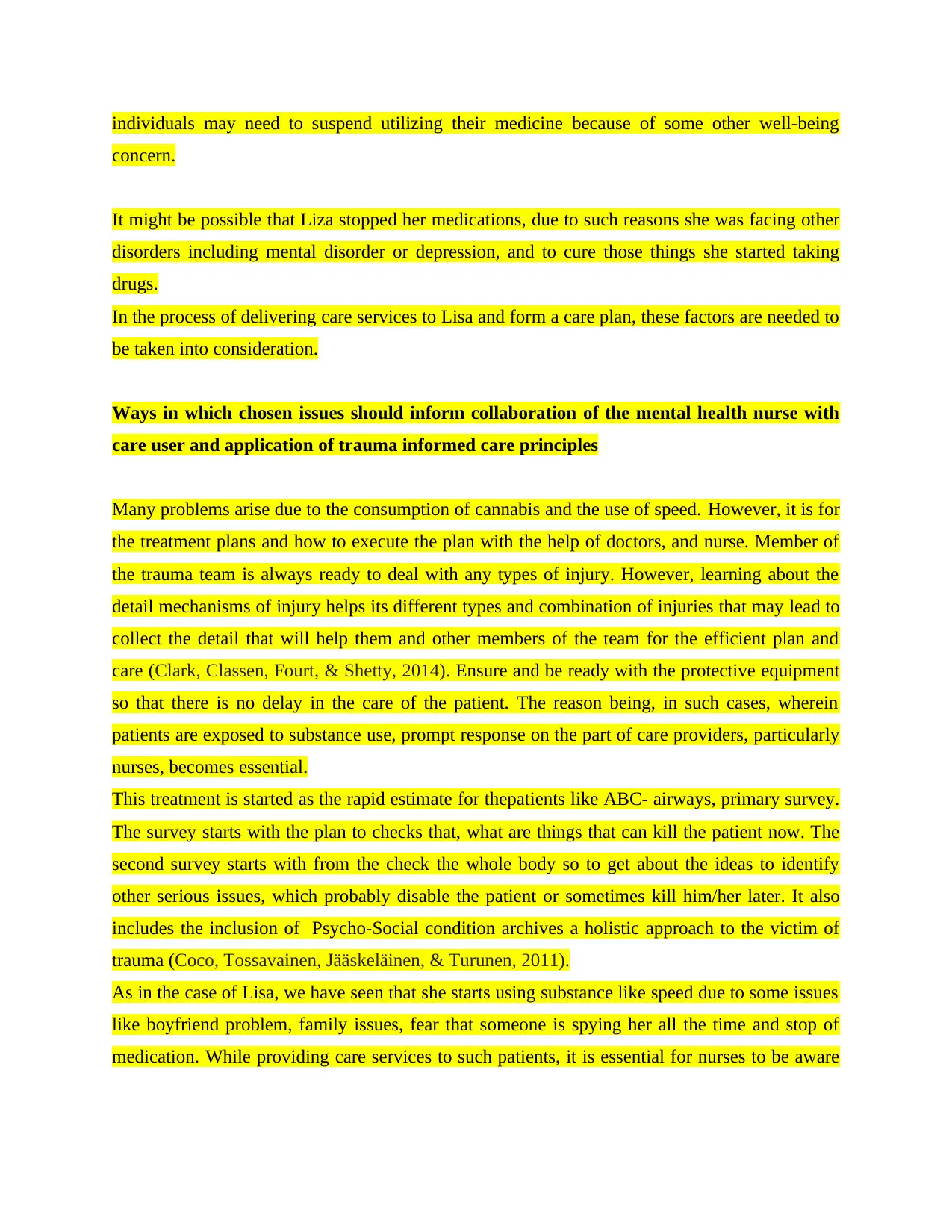
individuals may need to suspend utilizing their medicine because of some other well-being
concern.
It might be possible that Liza stopped her medications, due to such reasons she was facing other
disorders including mental disorder or depression, and to cure those things she started taking
drugs.
In the process of delivering care services to Lisa and form a care plan, these factors are needed to
be taken into consideration.
Ways in which chosen issues should inform collaboration of the mental health nurse with
care user and application of trauma informed care principles
Many problems arise due to the consumption of cannabis and the use of speed. However, it is for
the treatment plans and how to execute the plan with the help of doctors, and nurse. Member of
the trauma team is always ready to deal with any types of injury. However, learning about the
detail mechanisms of injury helps its different types and combination of injuries that may lead to
collect the detail that will help them and other members of the team for the efficient plan and
care (Clark, Classen, Fourt, & Shetty, 2014). Ensure and be ready with the protective equipment
so that there is no delay in the care of the patient. The reason being, in such cases, wherein
patients are exposed to substance use, prompt response on the part of care providers, particularly
nurses, becomes essential.
This treatment is started as the rapid estimate for thepatients like ABC- airways, primary survey.
The survey starts with the plan to checks that, what are things that can kill the patient now. The
second survey starts with from the check the whole body so to get about the ideas to identify
other serious issues, which probably disable the patient or sometimes kill him/her later. It also
includes the inclusion of Psycho-Social condition archives a holistic approach to the victim of
trauma (Coco, Tossavainen, Jääskeläinen, & Turunen, 2011).
As in the case of Lisa, we have seen that she starts using substance like speed due to some issues
like boyfriend problem, family issues, fear that someone is spying her all the time and stop of
medication. While providing care services to such patients, it is essential for nurses to be aware
concern.
It might be possible that Liza stopped her medications, due to such reasons she was facing other
disorders including mental disorder or depression, and to cure those things she started taking
drugs.
In the process of delivering care services to Lisa and form a care plan, these factors are needed to
be taken into consideration.
Ways in which chosen issues should inform collaboration of the mental health nurse with
care user and application of trauma informed care principles
Many problems arise due to the consumption of cannabis and the use of speed. However, it is for
the treatment plans and how to execute the plan with the help of doctors, and nurse. Member of
the trauma team is always ready to deal with any types of injury. However, learning about the
detail mechanisms of injury helps its different types and combination of injuries that may lead to
collect the detail that will help them and other members of the team for the efficient plan and
care (Clark, Classen, Fourt, & Shetty, 2014). Ensure and be ready with the protective equipment
so that there is no delay in the care of the patient. The reason being, in such cases, wherein
patients are exposed to substance use, prompt response on the part of care providers, particularly
nurses, becomes essential.
This treatment is started as the rapid estimate for thepatients like ABC- airways, primary survey.
The survey starts with the plan to checks that, what are things that can kill the patient now. The
second survey starts with from the check the whole body so to get about the ideas to identify
other serious issues, which probably disable the patient or sometimes kill him/her later. It also
includes the inclusion of Psycho-Social condition archives a holistic approach to the victim of
trauma (Coco, Tossavainen, Jääskeläinen, & Turunen, 2011).
As in the case of Lisa, we have seen that she starts using substance like speed due to some issues
like boyfriend problem, family issues, fear that someone is spying her all the time and stop of
medication. While providing care services to such patients, it is essential for nurses to be aware
Paraphrase This Document
Need a fresh take? Get an instant paraphrase of this document with our AI Paraphraser
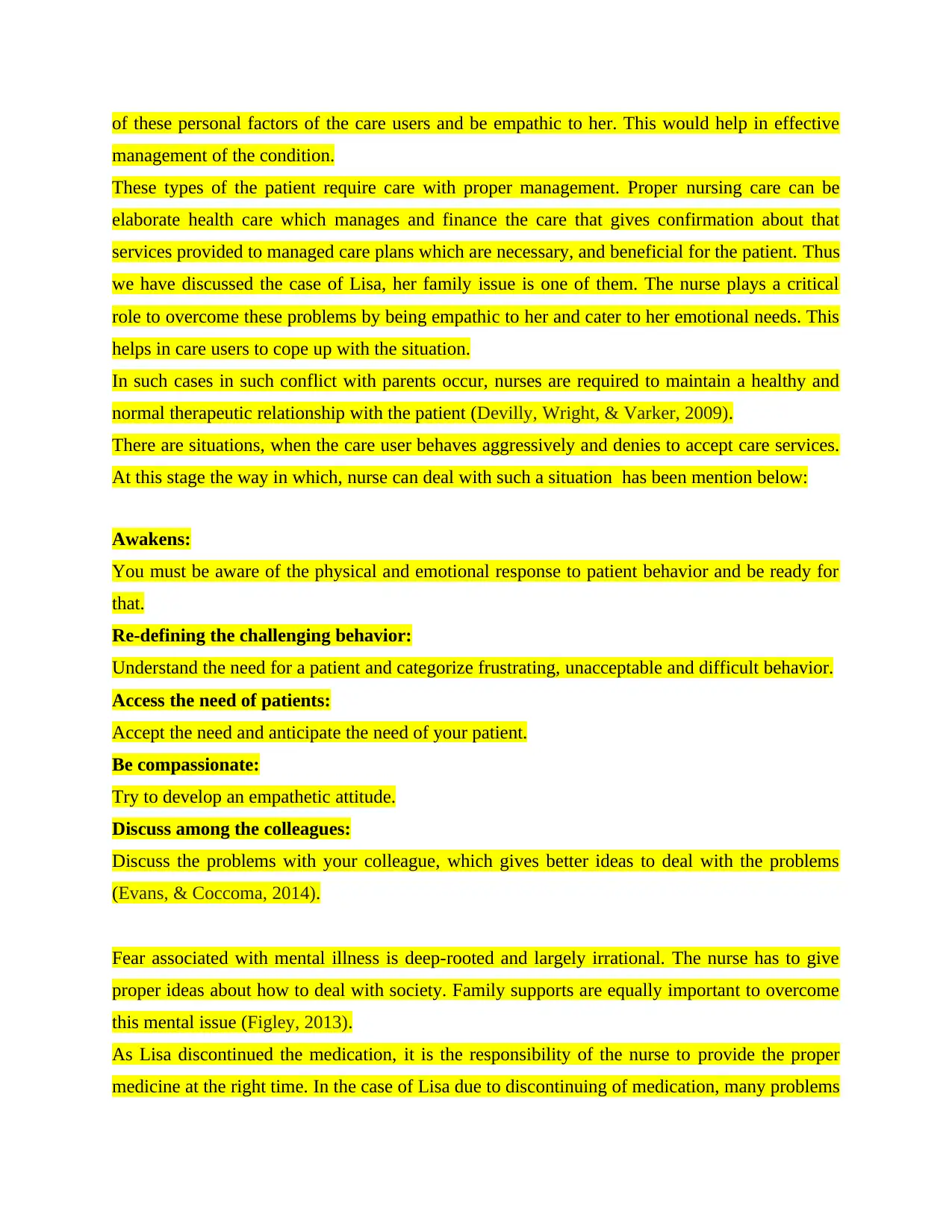
of these personal factors of the care users and be empathic to her. This would help in effective
management of the condition.
These types of the patient require care with proper management. Proper nursing care can be
elaborate health care which manages and finance the care that gives confirmation about that
services provided to managed care plans which are necessary, and beneficial for the patient. Thus
we have discussed the case of Lisa, her family issue is one of them. The nurse plays a critical
role to overcome these problems by being empathic to her and cater to her emotional needs. This
helps in care users to cope up with the situation.
In such cases in such conflict with parents occur, nurses are required to maintain a healthy and
normal therapeutic relationship with the patient (Devilly, Wright, & Varker, 2009).
There are situations, when the care user behaves aggressively and denies to accept care services.
At this stage the way in which, nurse can deal with such a situation has been mention below:
Awakens:
You must be aware of the physical and emotional response to patient behavior and be ready for
that.
Re-defining the challenging behavior:
Understand the need for a patient and categorize frustrating, unacceptable and difficult behavior.
Access the need of patients:
Accept the need and anticipate the need of your patient.
Be compassionate:
Try to develop an empathetic attitude.
Discuss among the colleagues:
Discuss the problems with your colleague, which gives better ideas to deal with the problems
(Evans, & Coccoma, 2014).
Fear associated with mental illness is deep-rooted and largely irrational. The nurse has to give
proper ideas about how to deal with society. Family supports are equally important to overcome
this mental issue (Figley, 2013).
As Lisa discontinued the medication, it is the responsibility of the nurse to provide the proper
medicine at the right time. In the case of Lisa due to discontinuing of medication, many problems
management of the condition.
These types of the patient require care with proper management. Proper nursing care can be
elaborate health care which manages and finance the care that gives confirmation about that
services provided to managed care plans which are necessary, and beneficial for the patient. Thus
we have discussed the case of Lisa, her family issue is one of them. The nurse plays a critical
role to overcome these problems by being empathic to her and cater to her emotional needs. This
helps in care users to cope up with the situation.
In such cases in such conflict with parents occur, nurses are required to maintain a healthy and
normal therapeutic relationship with the patient (Devilly, Wright, & Varker, 2009).
There are situations, when the care user behaves aggressively and denies to accept care services.
At this stage the way in which, nurse can deal with such a situation has been mention below:
Awakens:
You must be aware of the physical and emotional response to patient behavior and be ready for
that.
Re-defining the challenging behavior:
Understand the need for a patient and categorize frustrating, unacceptable and difficult behavior.
Access the need of patients:
Accept the need and anticipate the need of your patient.
Be compassionate:
Try to develop an empathetic attitude.
Discuss among the colleagues:
Discuss the problems with your colleague, which gives better ideas to deal with the problems
(Evans, & Coccoma, 2014).
Fear associated with mental illness is deep-rooted and largely irrational. The nurse has to give
proper ideas about how to deal with society. Family supports are equally important to overcome
this mental issue (Figley, 2013).
As Lisa discontinued the medication, it is the responsibility of the nurse to provide the proper
medicine at the right time. In the case of Lisa due to discontinuing of medication, many problems
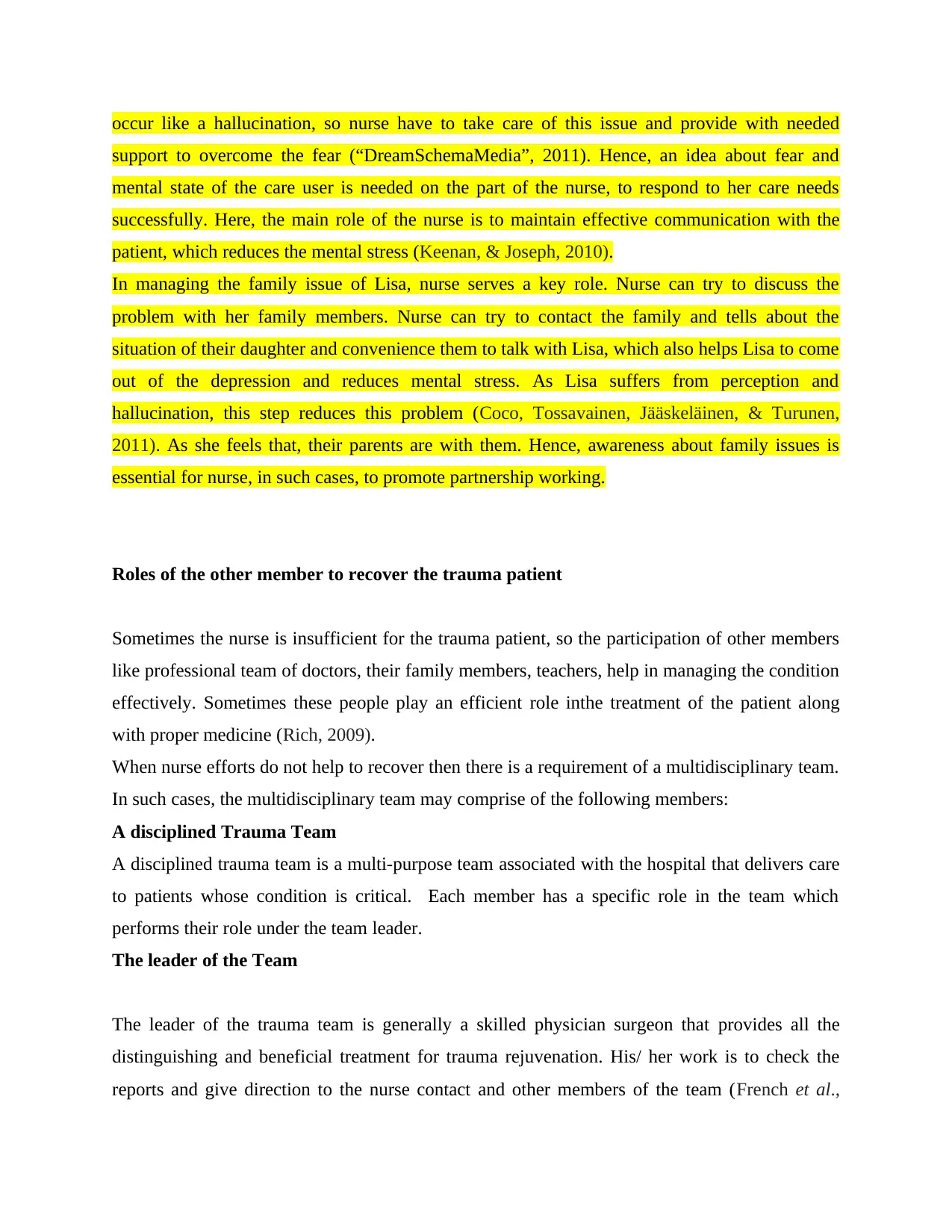
occur like a hallucination, so nurse have to take care of this issue and provide with needed
support to overcome the fear (“DreamSchemaMedia”, 2011). Hence, an idea about fear and
mental state of the care user is needed on the part of the nurse, to respond to her care needs
successfully. Here, the main role of the nurse is to maintain effective communication with the
patient, which reduces the mental stress (Keenan, & Joseph, 2010).
In managing the family issue of Lisa, nurse serves a key role. Nurse can try to discuss the
problem with her family members. Nurse can try to contact the family and tells about the
situation of their daughter and convenience them to talk with Lisa, which also helps Lisa to come
out of the depression and reduces mental stress. As Lisa suffers from perception and
hallucination, this step reduces this problem (Coco, Tossavainen, Jääskeläinen, & Turunen,
2011). As she feels that, their parents are with them. Hence, awareness about family issues is
essential for nurse, in such cases, to promote partnership working.
Roles of the other member to recover the trauma patient
Sometimes the nurse is insufficient for the trauma patient, so the participation of other members
like professional team of doctors, their family members, teachers, help in managing the condition
effectively. Sometimes these people play an efficient role inthe treatment of the patient along
with proper medicine (Rich, 2009).
When nurse efforts do not help to recover then there is a requirement of a multidisciplinary team.
In such cases, the multidisciplinary team may comprise of the following members:
A disciplined Trauma Team
A disciplined trauma team is a multi-purpose team associated with the hospital that delivers care
to patients whose condition is critical. Each member has a specific role in the team which
performs their role under the team leader.
The leader of the Team
The leader of the trauma team is generally a skilled physician surgeon that provides all the
distinguishing and beneficial treatment for trauma rejuvenation. His/ her work is to check the
reports and give direction to the nurse contact and other members of the team (French et al.,
support to overcome the fear (“DreamSchemaMedia”, 2011). Hence, an idea about fear and
mental state of the care user is needed on the part of the nurse, to respond to her care needs
successfully. Here, the main role of the nurse is to maintain effective communication with the
patient, which reduces the mental stress (Keenan, & Joseph, 2010).
In managing the family issue of Lisa, nurse serves a key role. Nurse can try to discuss the
problem with her family members. Nurse can try to contact the family and tells about the
situation of their daughter and convenience them to talk with Lisa, which also helps Lisa to come
out of the depression and reduces mental stress. As Lisa suffers from perception and
hallucination, this step reduces this problem (Coco, Tossavainen, Jääskeläinen, & Turunen,
2011). As she feels that, their parents are with them. Hence, awareness about family issues is
essential for nurse, in such cases, to promote partnership working.
Roles of the other member to recover the trauma patient
Sometimes the nurse is insufficient for the trauma patient, so the participation of other members
like professional team of doctors, their family members, teachers, help in managing the condition
effectively. Sometimes these people play an efficient role inthe treatment of the patient along
with proper medicine (Rich, 2009).
When nurse efforts do not help to recover then there is a requirement of a multidisciplinary team.
In such cases, the multidisciplinary team may comprise of the following members:
A disciplined Trauma Team
A disciplined trauma team is a multi-purpose team associated with the hospital that delivers care
to patients whose condition is critical. Each member has a specific role in the team which
performs their role under the team leader.
The leader of the Team
The leader of the trauma team is generally a skilled physician surgeon that provides all the
distinguishing and beneficial treatment for trauma rejuvenation. His/ her work is to check the
reports and give direction to the nurse contact and other members of the team (French et al.,
⊘ This is a preview!⊘
Do you want full access?
Subscribe today to unlock all pages.

Trusted by 1+ million students worldwide
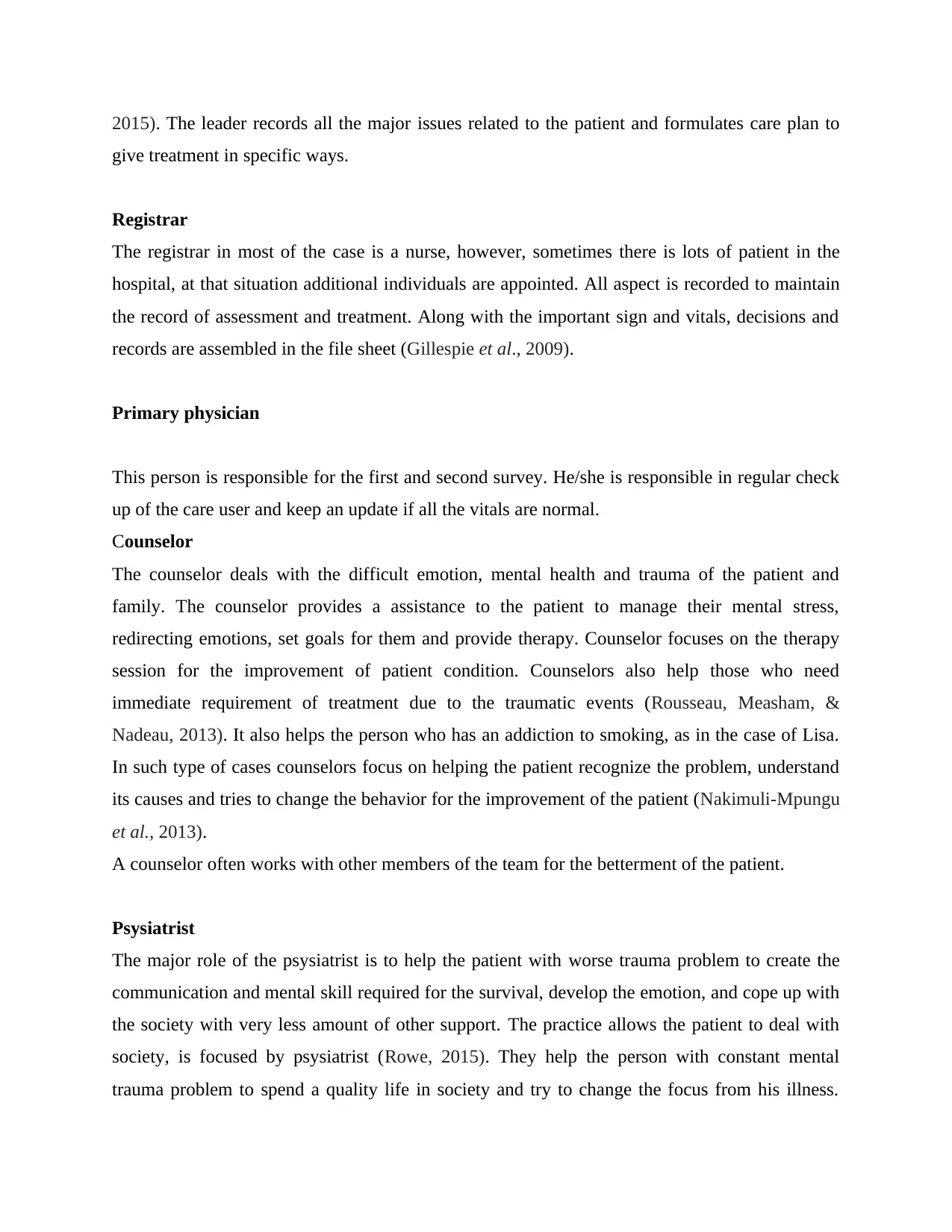
2015). The leader records all the major issues related to the patient and formulates care plan to
give treatment in specific ways.
Registrar
The registrar in most of the case is a nurse, however, sometimes there is lots of patient in the
hospital, at that situation additional individuals are appointed. All aspect is recorded to maintain
the record of assessment and treatment. Along with the important sign and vitals, decisions and
records are assembled in the file sheet (Gillespie et al., 2009).
Primary physician
This person is responsible for the first and second survey. He/she is responsible in regular check
up of the care user and keep an update if all the vitals are normal.
Counselor
The counselor deals with the difficult emotion, mental health and trauma of the patient and
family. The counselor provides a assistance to the patient to manage their mental stress,
redirecting emotions, set goals for them and provide therapy. Counselor focuses on the therapy
session for the improvement of patient condition. Counselors also help those who need
immediate requirement of treatment due to the traumatic events (Rousseau, Measham, &
Nadeau, 2013). It also helps the person who has an addiction to smoking, as in the case of Lisa.
In such type of cases counselors focus on helping the patient recognize the problem, understand
its causes and tries to change the behavior for the improvement of the patient (Nakimuli-Mpungu
et al., 2013).
A counselor often works with other members of the team for the betterment of the patient.
Psysiatrist
The major role of the psysiatrist is to help the patient with worse trauma problem to create the
communication and mental skill required for the survival, develop the emotion, and cope up with
the society with very less amount of other support. The practice allows the patient to deal with
society, is focused by psysiatrist (Rowe, 2015). They help the person with constant mental
trauma problem to spend a quality life in society and try to change the focus from his illness.
give treatment in specific ways.
Registrar
The registrar in most of the case is a nurse, however, sometimes there is lots of patient in the
hospital, at that situation additional individuals are appointed. All aspect is recorded to maintain
the record of assessment and treatment. Along with the important sign and vitals, decisions and
records are assembled in the file sheet (Gillespie et al., 2009).
Primary physician
This person is responsible for the first and second survey. He/she is responsible in regular check
up of the care user and keep an update if all the vitals are normal.
Counselor
The counselor deals with the difficult emotion, mental health and trauma of the patient and
family. The counselor provides a assistance to the patient to manage their mental stress,
redirecting emotions, set goals for them and provide therapy. Counselor focuses on the therapy
session for the improvement of patient condition. Counselors also help those who need
immediate requirement of treatment due to the traumatic events (Rousseau, Measham, &
Nadeau, 2013). It also helps the person who has an addiction to smoking, as in the case of Lisa.
In such type of cases counselors focus on helping the patient recognize the problem, understand
its causes and tries to change the behavior for the improvement of the patient (Nakimuli-Mpungu
et al., 2013).
A counselor often works with other members of the team for the betterment of the patient.
Psysiatrist
The major role of the psysiatrist is to help the patient with worse trauma problem to create the
communication and mental skill required for the survival, develop the emotion, and cope up with
the society with very less amount of other support. The practice allows the patient to deal with
society, is focused by psysiatrist (Rowe, 2015). They help the person with constant mental
trauma problem to spend a quality life in society and try to change the focus from his illness.
Paraphrase This Document
Need a fresh take? Get an instant paraphrase of this document with our AI Paraphraser

This helps the patient to recover. So the other major outcomes of clinical condition become
relevant. Pysiatrist deals with the social life community, family, work and quality of life of the
patient.
relevant. Pysiatrist deals with the social life community, family, work and quality of life of the
patient.
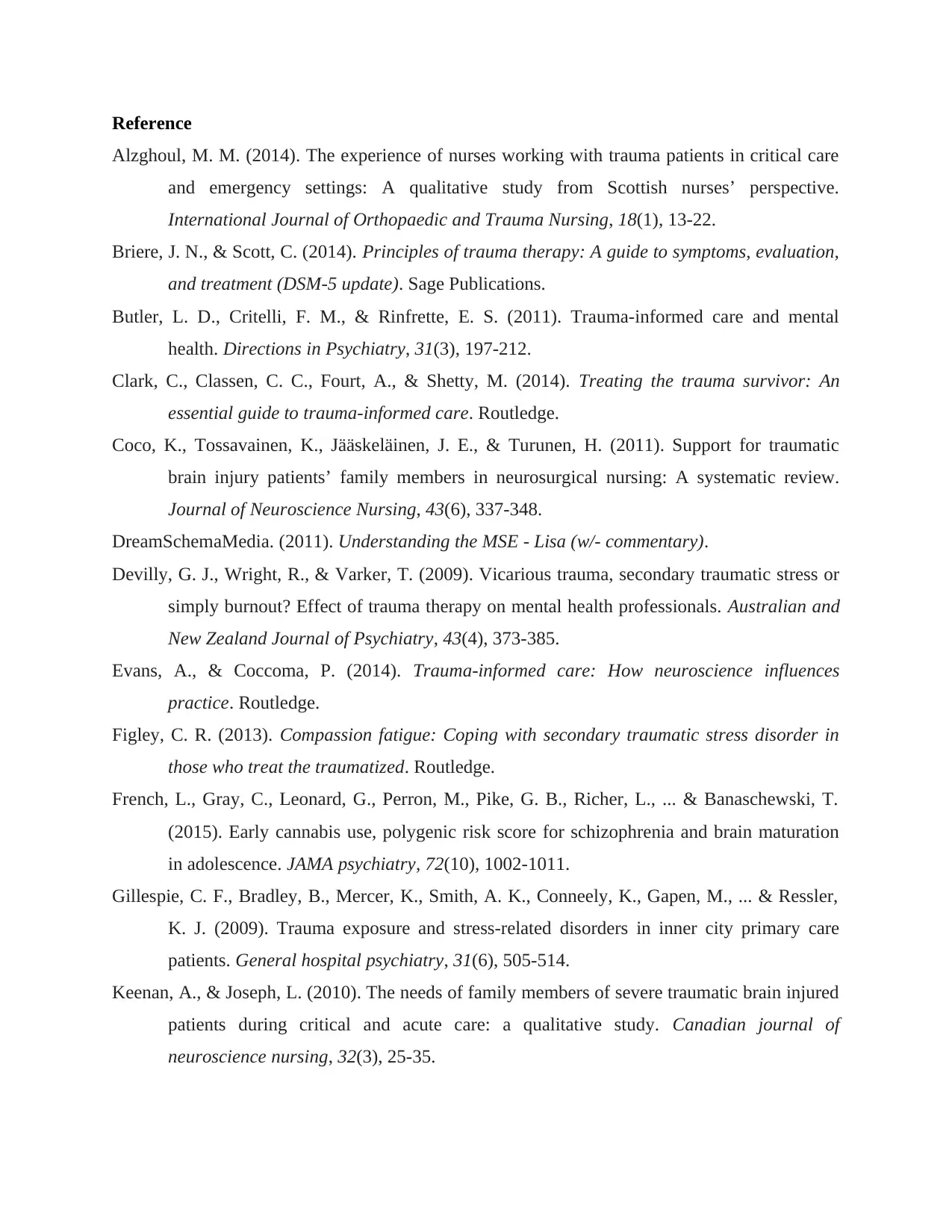
Reference
Alzghoul, M. M. (2014). The experience of nurses working with trauma patients in critical care
and emergency settings: A qualitative study from Scottish nurses’ perspective.
International Journal of Orthopaedic and Trauma Nursing, 18(1), 13-22.
Briere, J. N., & Scott, C. (2014). Principles of trauma therapy: A guide to symptoms, evaluation,
and treatment (DSM-5 update). Sage Publications.
Butler, L. D., Critelli, F. M., & Rinfrette, E. S. (2011). Trauma-informed care and mental
health. Directions in Psychiatry, 31(3), 197-212.
Clark, C., Classen, C. C., Fourt, A., & Shetty, M. (2014). Treating the trauma survivor: An
essential guide to trauma-informed care. Routledge.
Coco, K., Tossavainen, K., Jääskeläinen, J. E., & Turunen, H. (2011). Support for traumatic
brain injury patients’ family members in neurosurgical nursing: A systematic review.
Journal of Neuroscience Nursing, 43(6), 337-348.
DreamSchemaMedia. (2011). Understanding the MSE - Lisa (w/- commentary).
Devilly, G. J., Wright, R., & Varker, T. (2009). Vicarious trauma, secondary traumatic stress or
simply burnout? Effect of trauma therapy on mental health professionals. Australian and
New Zealand Journal of Psychiatry, 43(4), 373-385.
Evans, A., & Coccoma, P. (2014). Trauma-informed care: How neuroscience influences
practice. Routledge.
Figley, C. R. (2013). Compassion fatigue: Coping with secondary traumatic stress disorder in
those who treat the traumatized. Routledge.
French, L., Gray, C., Leonard, G., Perron, M., Pike, G. B., Richer, L., ... & Banaschewski, T.
(2015). Early cannabis use, polygenic risk score for schizophrenia and brain maturation
in adolescence. JAMA psychiatry, 72(10), 1002-1011.
Gillespie, C. F., Bradley, B., Mercer, K., Smith, A. K., Conneely, K., Gapen, M., ... & Ressler,
K. J. (2009). Trauma exposure and stress-related disorders in inner city primary care
patients. General hospital psychiatry, 31(6), 505-514.
Keenan, A., & Joseph, L. (2010). The needs of family members of severe traumatic brain injured
patients during critical and acute care: a qualitative study. Canadian journal of
neuroscience nursing, 32(3), 25-35.
Alzghoul, M. M. (2014). The experience of nurses working with trauma patients in critical care
and emergency settings: A qualitative study from Scottish nurses’ perspective.
International Journal of Orthopaedic and Trauma Nursing, 18(1), 13-22.
Briere, J. N., & Scott, C. (2014). Principles of trauma therapy: A guide to symptoms, evaluation,
and treatment (DSM-5 update). Sage Publications.
Butler, L. D., Critelli, F. M., & Rinfrette, E. S. (2011). Trauma-informed care and mental
health. Directions in Psychiatry, 31(3), 197-212.
Clark, C., Classen, C. C., Fourt, A., & Shetty, M. (2014). Treating the trauma survivor: An
essential guide to trauma-informed care. Routledge.
Coco, K., Tossavainen, K., Jääskeläinen, J. E., & Turunen, H. (2011). Support for traumatic
brain injury patients’ family members in neurosurgical nursing: A systematic review.
Journal of Neuroscience Nursing, 43(6), 337-348.
DreamSchemaMedia. (2011). Understanding the MSE - Lisa (w/- commentary).
Devilly, G. J., Wright, R., & Varker, T. (2009). Vicarious trauma, secondary traumatic stress or
simply burnout? Effect of trauma therapy on mental health professionals. Australian and
New Zealand Journal of Psychiatry, 43(4), 373-385.
Evans, A., & Coccoma, P. (2014). Trauma-informed care: How neuroscience influences
practice. Routledge.
Figley, C. R. (2013). Compassion fatigue: Coping with secondary traumatic stress disorder in
those who treat the traumatized. Routledge.
French, L., Gray, C., Leonard, G., Perron, M., Pike, G. B., Richer, L., ... & Banaschewski, T.
(2015). Early cannabis use, polygenic risk score for schizophrenia and brain maturation
in adolescence. JAMA psychiatry, 72(10), 1002-1011.
Gillespie, C. F., Bradley, B., Mercer, K., Smith, A. K., Conneely, K., Gapen, M., ... & Ressler,
K. J. (2009). Trauma exposure and stress-related disorders in inner city primary care
patients. General hospital psychiatry, 31(6), 505-514.
Keenan, A., & Joseph, L. (2010). The needs of family members of severe traumatic brain injured
patients during critical and acute care: a qualitative study. Canadian journal of
neuroscience nursing, 32(3), 25-35.
⊘ This is a preview!⊘
Do you want full access?
Subscribe today to unlock all pages.

Trusted by 1+ million students worldwide
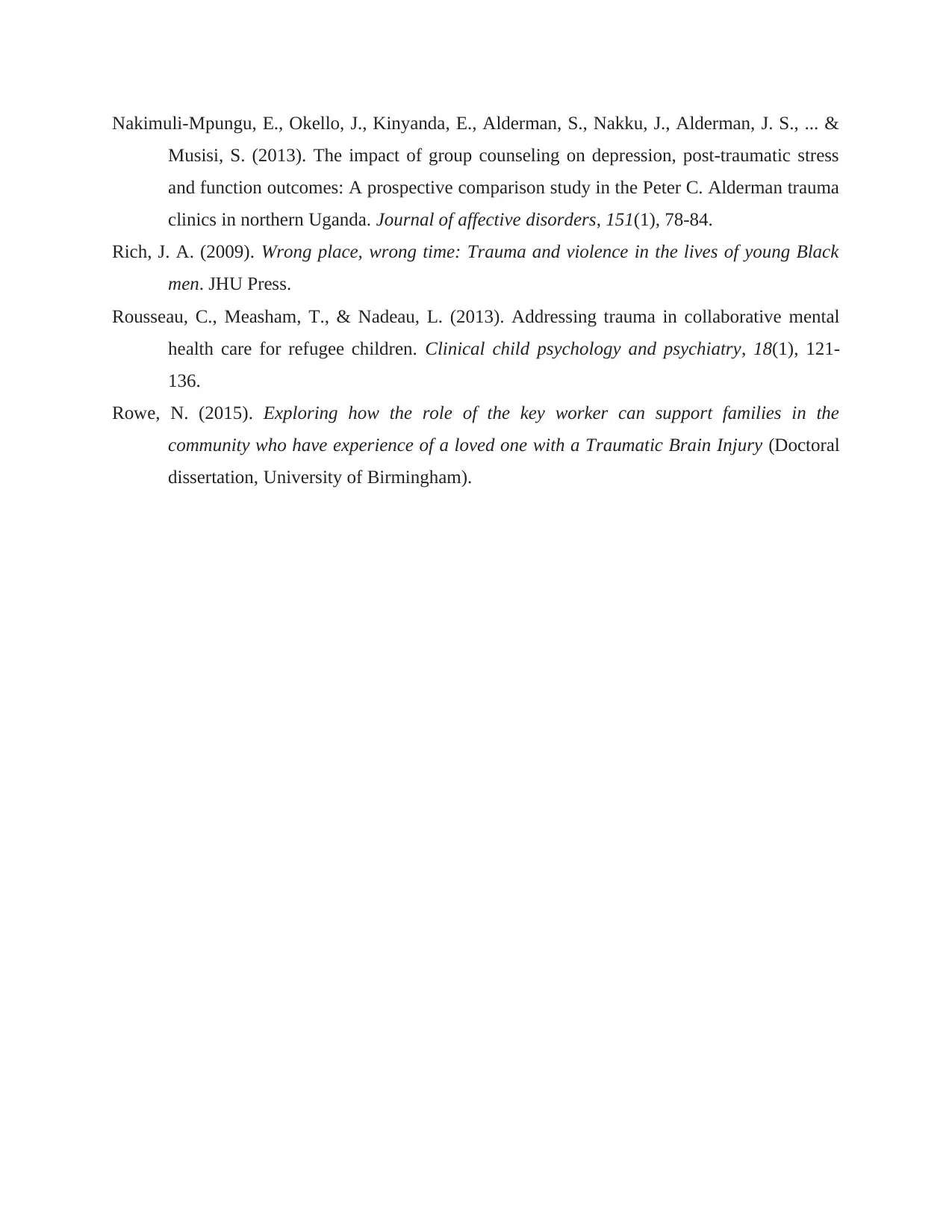
Nakimuli-Mpungu, E., Okello, J., Kinyanda, E., Alderman, S., Nakku, J., Alderman, J. S., ... &
Musisi, S. (2013). The impact of group counseling on depression, post-traumatic stress
and function outcomes: A prospective comparison study in the Peter C. Alderman trauma
clinics in northern Uganda. Journal of affective disorders, 151(1), 78-84.
Rich, J. A. (2009). Wrong place, wrong time: Trauma and violence in the lives of young Black
men. JHU Press.
Rousseau, C., Measham, T., & Nadeau, L. (2013). Addressing trauma in collaborative mental
health care for refugee children. Clinical child psychology and psychiatry, 18(1), 121-
136.
Rowe, N. (2015). Exploring how the role of the key worker can support families in the
community who have experience of a loved one with a Traumatic Brain Injury (Doctoral
dissertation, University of Birmingham).
Musisi, S. (2013). The impact of group counseling on depression, post-traumatic stress
and function outcomes: A prospective comparison study in the Peter C. Alderman trauma
clinics in northern Uganda. Journal of affective disorders, 151(1), 78-84.
Rich, J. A. (2009). Wrong place, wrong time: Trauma and violence in the lives of young Black
men. JHU Press.
Rousseau, C., Measham, T., & Nadeau, L. (2013). Addressing trauma in collaborative mental
health care for refugee children. Clinical child psychology and psychiatry, 18(1), 121-
136.
Rowe, N. (2015). Exploring how the role of the key worker can support families in the
community who have experience of a loved one with a Traumatic Brain Injury (Doctoral
dissertation, University of Birmingham).
1 out of 10
Your All-in-One AI-Powered Toolkit for Academic Success.
+13062052269
info@desklib.com
Available 24*7 on WhatsApp / Email
![[object Object]](/_next/static/media/star-bottom.7253800d.svg)
Unlock your academic potential
Copyright © 2020–2025 A2Z Services. All Rights Reserved. Developed and managed by ZUCOL.

